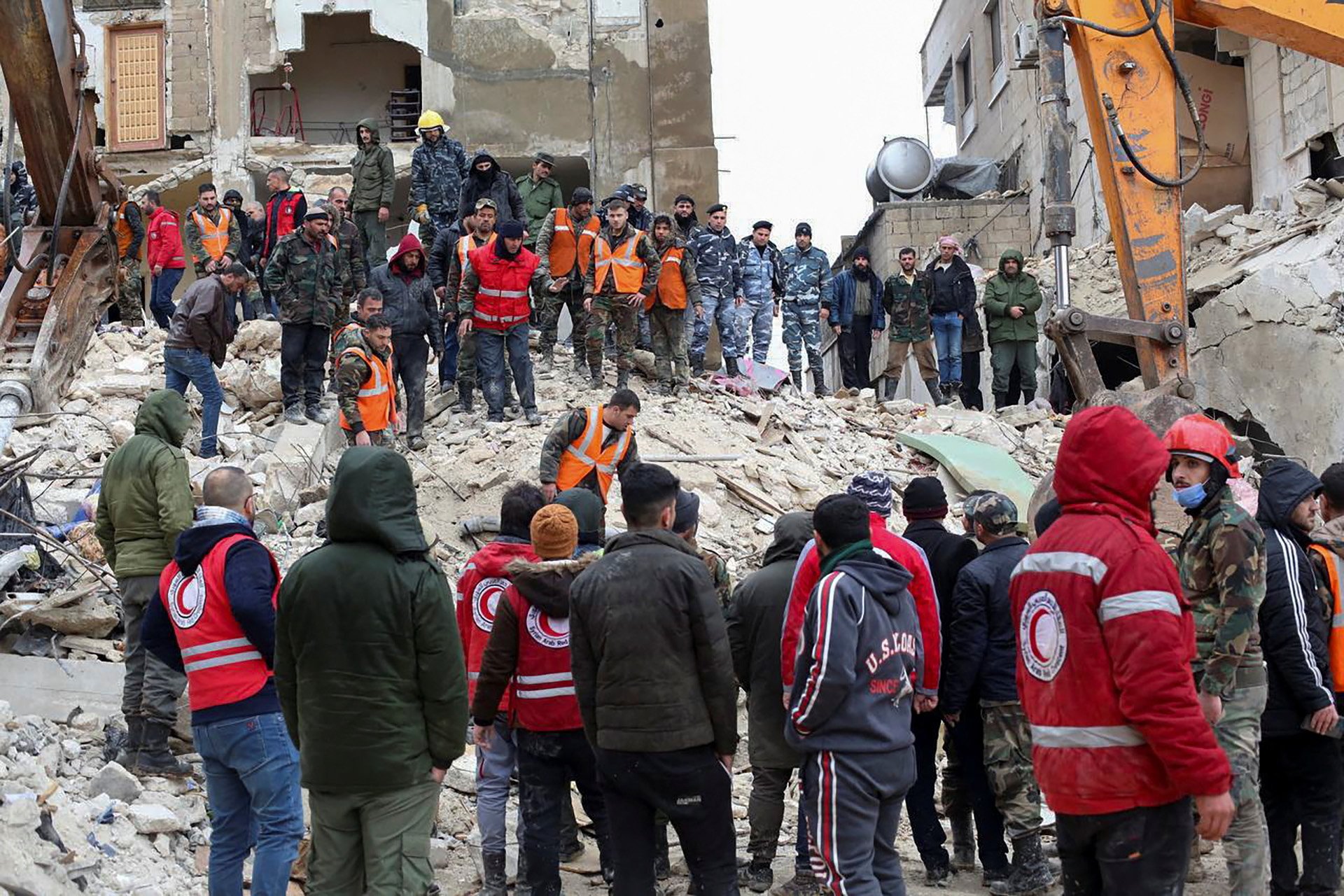Monday’s deadly earthquakes in Türkiye and Syria hit a region where millions are already deep in the midst of a humanitarian crisis, and where response efforts will be complicated by issues of territorial control and damage to a major aid hub.
A first 7.8-magnitude earthquake struck before dawn near the Turkish city of Gaziantep, home to 2 million people, including around 500,000 Syrian refugees. A 7.5-magnitude earthquake rocked the same area hours later, as winter storms made matters worse.
Türkiye lies on several fault lines and has a history of disastrous earthquakes, but Monday’s appeared to be the worst in decades, with the early toll passing 2,000. A 1999 earthquake killed around 17,000 people and left hundreds of thousands homeless.
As first responders continued search-and-rescue efforts, aid officials expressed concern over how the disaster would impact assistance, not just for earthquake survivors, but also for millions displaced by conflict in a region with vast long-term needs.
Read more: A reading list on the pre-quake crisis in Syria’s rebel-held northwest
With thousands of buildings collapsed and many people likely still stuck under the rubble, Yunus Sezer, chair of AFAD, Türkiye’s emergency and disaster management authority, said teams were being deployed “24/7”.
Dozens of countries offered to support Türkiye, but getting aid to affected Syrians is likely to be more difficult, given that the country is not controlled by one authority.
After nearly 12 years of war in Syria, President Bashar al-Assad’s government is in charge in most of the country, but the rest is divided into sometimes overlapping zones of control. The northwest, including Idlib province, is largely run by militant rebel faction Hayat Tahrir al-Sham. Parts of the northeast are occupied by Türkiye and Türkiye-backed militias, while other areas are controlled by Kurdish groups.
Northwest Syria is home to more than 4 million people, around half of whom have been forced to flee their homes at least once by the war. Even before the earthquake disaster, a crippling economic crisis had driven humanitarian needs in Syria this year to record levels.
Due largely to pressure from Moscow, the UN Security Council has reduced the UN’s access to the northwest from Türkiye to one border crossing, Bab al-Hawa, which itself appears to have suffered heavy earthquake damage.
It can use this crossing without permission from al-Assad, but only for aid into Idlib and its surrounding provinces. Moving aid across front lines in Syria has proved problematic at best, and almost impossible at worst.
“The impact is massive,” Dr Ghanem Tayara, president of the Union Of Medical Care And Relief Organizations (UOSSM), which works in northwest Syria, told The New Humanitarian.
“The movement of aid through the border will be disrupted due to the damage caused by the earthquake,” Tayara said. “The situation is very unsettling due to high casualties and uncertainty in the north of Syria, as well as on the Turkish/Syrian borders.”
Gaziantep was extremely close to the quake epicentres. Entire high-rise blocks were destroyed in the city, homes collapsed, and cars were crushed. This could also affect response efforts as the city is the major hub for aid groups working across the border in rebel-held northwest Syria.
Many people in the northwest’s border regions live in informal camps that can be easily destroyed by heavy winter rains and snow, let alone massive quakes. Ensuring shelter for so many people will be crucial in the winter cold, and snow in some parts of Syria and Türkiye may also complicate aid efforts, making it even more difficult to reach rural areas.
The Syrian Civil Defence, better known as the White Helmets, posted pictures on Twitter of collapsed buildings and rescue attempts in northwest Syria, saying: “Catastrophe & devastation… Hundreds dead, injured, trapped under the rubble, or stranded in the winter cold. Homes, buildings, and residential areas [are] completely destroyed. Urgent support needed for response efforts.”
As Tanya Evans, Syria country director for the International Rescue Committee (IRC), said in a Monday statement: “It is a crisis within multiple crises – temperatures are plummeting to below zero leaving thousands exposed.”
Ensuring access to clean water to prevent waterborne diseases will be especially crucial given the ongoing cholera outbreak in Syria. There have been 84,607 suspected cases and 101 deaths since late August.
But hospitals and other health facilities in Syria have already been battered by years of conflict, especially a 2019 offensive by al-Assad and his Russian allies on the rebel groups that control the region.
“Hospitals are overwhelmed with the number of crush and trauma injuries,” the UOSSM said in a statement. “At least one hospital in northern Syria is being evacuated after its structure was compromised.” Other hospitals have also had to evacuate patients and stop work due to earthquake damage.
Edited by Andrew Gully.





